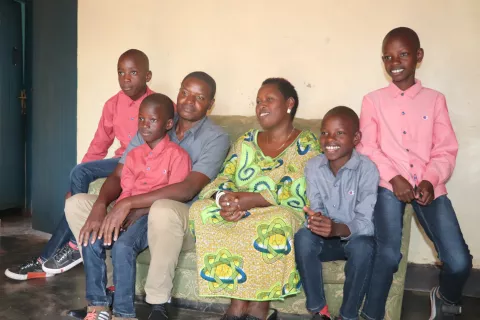UNICEF delivers hygiene supplies to help children with disabilities fight COVID-19
Essential supplies like soap, handwashing stations and sanitizer will help vulnerable children in 12 institutional care facilities prevent coronavirus infections.
- Available in:
- English
- Kinyarwanda
MUSANZE, Rwanda – By now, almost everyone knows that handwashing and social distancing are some of the most effective ways to prevent the spread of coronavirus. With over 250 confirmed cases of COVID-19 in Rwanda, the Government has established strong prevention measures – such as closing schools and cross-border travel – which has helped slow the spread of the virus.
But for some children with disabilities in Rwanda, this is not enough to protect them. Residential care institutions can sometimes house up to 200 children with disabilities in close quarters, making social distancing difficult. These centres also lack enough critical hygiene supplies like soap to keep everyone healthy during the pandemic.
In bustling Musanze, just 500 meters from downtown and the main bus park, Saint Vincent is one such centre. But luckily, most children residing there understand what they need to do.
“Coronavirus is transmitted by coughing or sneezing on someone,” says Clemence. He has lived at Saint Vincent for 10 years.
“You can prevent COVID-19 by washing your hands a lot, using soap and clean water.”

Supporting children with disabilities
"UNICEF primarily supports family-based alternative care for children rather than institutional living, but not all children with disabilities have been placed into homes yet," says Patricia Lim Ah Ken, UNICEF Chief of Child Protection. "Providing these hygiene supplies in the short-term is critical to address the immediate risk of coronavirus, ensuring all children remain healthy and safe."
Until recently, Saint Vincent could not keep up with the increased use of soap and other hygiene supplies. Sister Priscah Uwamahoro, Coordinator of Saint Vincent for five years, worried the disease could spread to her centre.
"The supplies we had were not enough."

Fighting COVID-19 for children
To help Sister Priscah fight COVID-19, UNICEF delivered hygiene kits to Saint Vincent, as well as 10 other residential care institutions, reaching in total over 190 children and young adults with disabilities plus 52 of their caregivers. These kits include essential supplies like laundry soap, cleaning solution, bathing soap, menstrual hygiene pads, and handwashing stations.
“To fight coronavirus, we must keep our bodies, homes and environments clean,” says Sister Priscah. “With these supplies, the children here will be better protected and will also learn more about proper hygiene.”
Many children in Rwanda are feeling the secondary effects of the COVID-19 pandemic. In addition to these hygiene supplies, UNICEF has procured therapeutic milk and ready-to-use therapeutic food for children suffering from severe acute malnutrition. UNICEF also supports Rwanda Education Board to develop remote learning opportunities for students affected by school closures, such as radio and TV lessons.
"We are filled with so much joy because of these hygiene supplies. They are much needed in our daily lives, and especially to stop the spread of COVID-19."

To find loving, family-based care alternatives for children with disabilities, UNICEF supports the “Tubarerere mu Muryango” programme with Rwanda’s National Commission for Children. Check out these case studies on the Tubarerere mu Muryango programme and how UNICEF has helped find homes for nearly 3,200 children.




